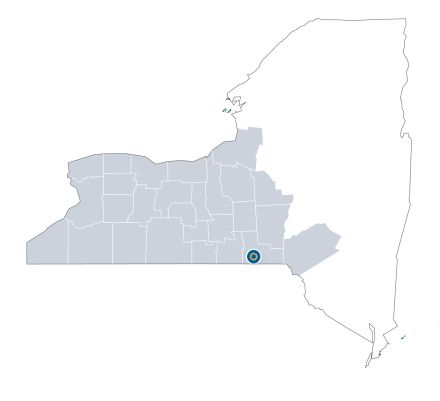The NSF Energy Storage Engine in Upstate New York, led by Binghamton University, aims to establish a tech-based, industry-driven hub for new battery componentry, sustainable cell manufacturing, material sourcing and recovery, pilot manufacturing and safety testing, applications integration and workforce development.
Year 1 impacts:
Accelerating innovation: In its first year, the NSF Energy Storage Engine awarded $1.6 million in funding to nine industry/academic collaborative initiatives that address significant challenges for the U.S. advanced battery industry including the elimination of toxic solvents and forever chemicals, which also is the most energy-intensive part of the manufacturing process. Together, these use-inspired research and development projects bring seventeen organizations in cross-sector partnerships that will accelerate the creation of a sustainable, domestically produced battery supply chain.
Additionally, the NSF Energy Storage Engine's "SuperBoost" technology translation award program for startups aims to dramatically reduce the time to market of critical battery technologies from over five years to less than two years. To date, two SuperBoost awards have been made and five more are in the pipeline to be awarded soon, totaling almost $1 million. These grants connect promising startups with critical prototyping and test bed infrastructure providers in the region and support the advancement of technologies such as electrode manufacturing that is and more efficient, fast charging and higher energy density batteries, commercial technologies that reduce or eliminate battery fire hazards, and technologies that are advancing recycling and reuse in the energy storage industry. The NSF Engine's first SuperBoost awardee, Ateios Systems, is a success story already, having received a letter of intent from a customer to supply next-generation, high-energy dense, environmentally friendly battery components in a $3.6 million contract. The translation pillar has identified close to 50 energy storage startup companies within the NSF Engine's region and beyond and is actively engaging with them to strengthen entrepreneurial activity and grow the ecosystem.
- Attracting additional investment: Core partner Launch NY has raised multiple sources of capital to support the ecosystem's startup companies, including $15 million for investment in the region through Launch NY's Limited Partner Fund II, and an additional $1.5 million from the Ralph C. Wilson, Jr. Foundation growing the Launch NY Nonprofit Seed Fund to $8 million. These funds fueled Launch NY's $250,000 investment in battery recycling company Bridge Green Upcycle in the region.
Building partnerships: The broad coalition of partners has grown to over 40 academic, industry, government and community organizations and stakeholders. Most recently, the NSF Energy Storage Engine's lead institution, Binghamton University, signed a memorandum of understanding (MOU) with aerospace and security company BAE Systems to collaborate on research and development in materials, performance modeling and manufacturing processes for power and energy storage applications. The MOU also calls for developing new education and workforce training programs that span high school to post-secondary education, with a commitment from BAE Systems to provide matching funds for workforce development grants provided by the NSF Engine and internships for engine-nominated students.
Funded in partnership with the New York State Empire State Development (ESD), the NSF Energy Storage Engine is working with coalition partner RIT Battery Development Center to establish a state-of-the-art battery safety testing center at Kodak Park in Rochester, New York. This facility will be instrumental in advancing battery safety research with adherence to the highest industry standards. In a complementary effort, Battery-NY, funded by the U.S. Department of Commerce's Economic Development Administration and the ESD, is outfitting an empty building in the region to become a bustling, first-of-its-kind facility for prototyping and developing batteries. By 2026, this Battery-NY space will be transformed into a facility designed to support a variety of different battery cell formats and chemistries, from grid storage to automotive power to aerospace and outer space.
- Expanding the future workforce: To ensure residents are prepared and qualified for the new jobs coming to the region, the NSF Energy Storage Engine launched the Energy Storage Workforce Development Network, leveraging the strength of many partners to maximize impact by bringing together education, training and workforce development organizations across the region of service. The primary intent of the network is to ensure scalability, replicability and long-term sustainability of the workforce development programs funded by the NSF Engine. The first funding announcement under this network attracted proposals from a wide range of institutions equipped to create new educational and training opportunities to build the talent pipeline and address skills gaps in the growing battery industry. To date, eight proposals totaling $1.1 million have been awarded, with additional awards in the pipeline. Through these programs, the NSF Engine anticipates engaging 275 learners across grades 9-12, higher education, nondegree and adult training in its first award period.
- Growing the local economy: Building on the momentum of NSF funding and other state and federal investments supporting the growing ecosystem, multiple key industry partners announced expansions or new operations in upstate New York. In September, Raymond Corporation, a Toyota subsidiary and leading global provider of material handling products and logistics solutions, announced the opening of their lithium-ion battery manufacturing center in Kirkwood, New York. Additionally, Li-Cycle, a global lithium-ion battery resource recovery company, and Electrovaya, a developer and manufacturer of lithium-ion batteries, both received funding to further expand their operations in the region. Most recently, BAE Systems announced a $65 million investment in Endicott, New York, to add a new battery production line that can create up to 134 jobs onsite, demonstrating continued investment by New York in support of the region's comprehensive strategy to revitalize communities and grow the economy by focusing on energy solutions.
Additional information
Lead organization: Binghamton University.
Region of service: Upstate New York.
NSF award: NSF-2315695
| Critical and emerging technology areas |
|---|
| Advanced energy and industrial efficiency technologies, advanced computing and semiconductors, advanced materials, data and cybersecurity, disaster prevention and mitigation, robotics and advanced manufacturing. |



